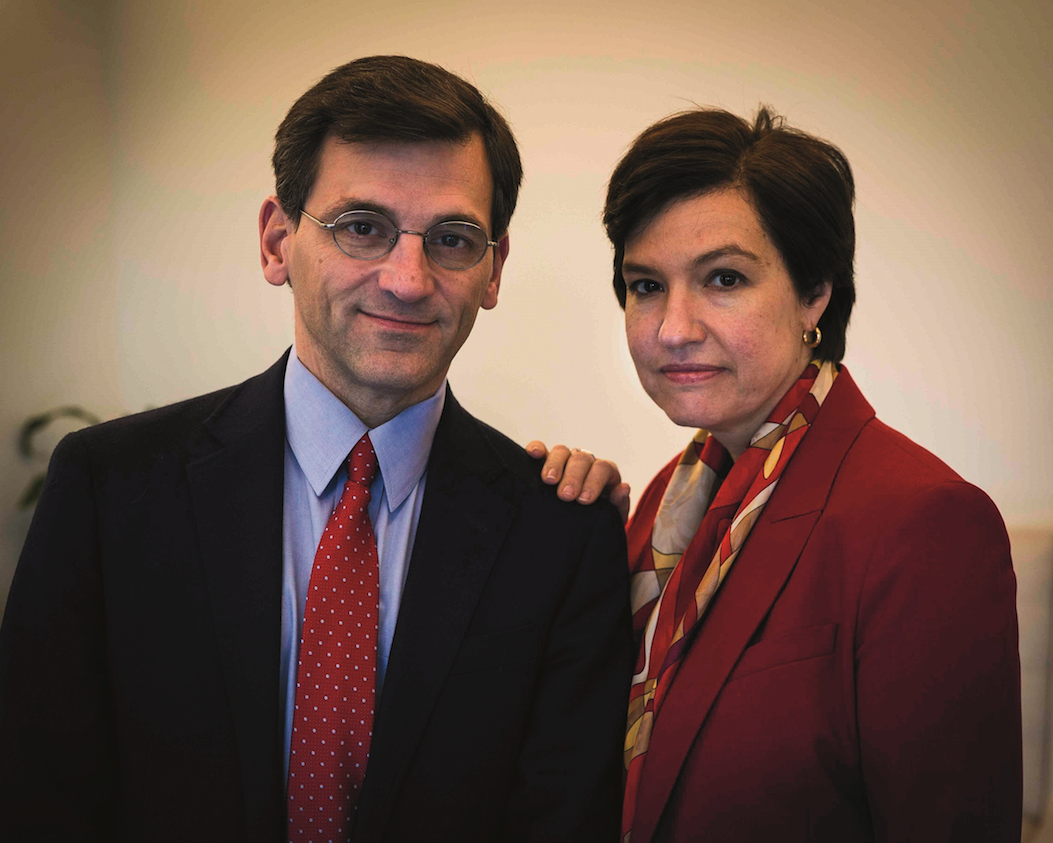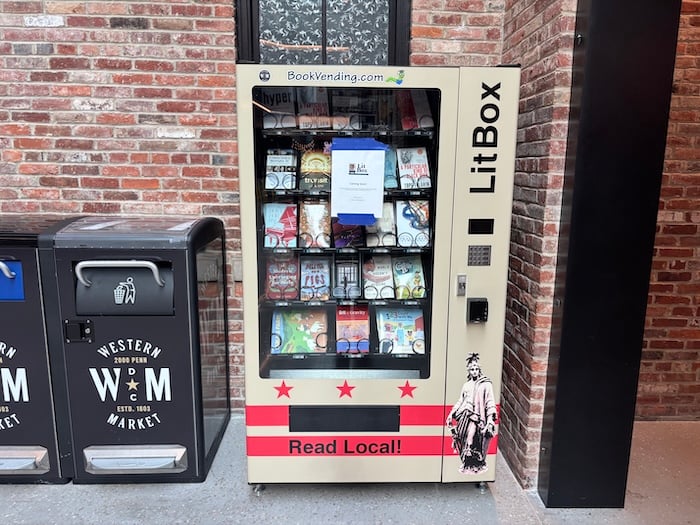Journalism power-couple Susan Glasser, a staff writer at the New Yorker, and Peter Baker, the New York Times’ chief White House correspondent, have cowritten The Man Who Ran Washington, a biography of former Secretary of State and White House chief of staff James A. Baker III, arguably the 20th century’s savviest DC power player.
Baker played a role in nearly every major event near the turn of the century. But he has in recent years struggled with whether to support Donald Trump, highlighting the tension that has defined this political insider’s life: between Baker the bare-knuckle operative and Baker the urbane and ecumenical statesman.
In an interview edited for length and clarity, Glasser and Baker (who is not related to James) talk about what it was like collaborating on their new book and where they think their subject fits in modern American history.
You worked together on a previous book, Kremlin Rising. What’s it like collaborating? Did you learn anything new about each other’s habits?
Glasser: Well, the good news is we’re still married, and actually about to celebrate our 20th anniversary.
Baker: It’s a challenge obviously for any two authors working on a book together, but it’s also a force multiplier. Susan and I met as journalists to begin with—she was my editor at the Washington Post. So we established who was in charge from that experience. Once you had that set in the beginning, it’s clearer from there.
I couldn’t believe how many bipartisan deals Baker orchestrated. Was that due to his talents, or was it the era?
Glasser: Jim Baker [is] the story not only of this particular individual but also of Washington from the end of Watergate to the end of the Cold War. This is a definitive period in our national politics in which Baker essentially was a dominant figure, both terms of politics and in terms of policy. That simply isn’t possible today. Can you imagine someone filling the roles of both Karl Rove and Henry Kissinger today? It’s inconceivable.
Both Peter and I came away reinforced with the idea that individuals do matter and that history is not inevitable. You look at something like how he steered Reagan’s first term as his chief of staff in the White House, or how he was able to make certain deals by seeing his way through to do something like tax reform. The example that is probably most resonant to me is German reunification—over the period of these nine remarkable months, from the fall of the Wall in 1989 through 1990, when you had the invasion of Kuwait. It just wasn’t a done deal. It took Baker to really navigate it.
He told us that he thought Donald Trump was nuts. And yet he couldn’t bring himself to vote against him.
Baker: It’s the marriage of man and moment—you have to somebody with Baker’s skill set and willingness to work across the aisle, and you also have to have an atmosphere in which that’s possible. In the tax reform case you had Democrats as well as Republicans making this promise that they were going to overhaul the tax code, and both sides saw an advantage in doing that. Today it’s so hard to see two parties coming together and recognizing common interest. The word compromise is seen as a dirty word; compromise today means caving in, it means cowardice, it means concession.
So there’s no question that Baker brought a particular gift to that moment, but it was a moment that was open for a Baker to come along. We had this question all along: Could Baker work in today’s environment? The story is about how Washington has changed as much as anything else.
Of all the many examples where Baker displayed that talent you describe, which one stood out most for each of you? That is, cases where Baker made the decisive difference.
Glasser: Let’s go back to German reunification. In hindsight it seems inevitable, but it really wasn’t at the time. People forget: It wasn’t just the Soviets who were panicked and wary at the thought of the unraveling of their eastern empire, but actually it was Margaret Thatcher and the French who were deeply concerned about the strengthening of Germany after two catastrophic world wars. They pushed back hard, hard, hard on Bush and Baker. Not only that, but the Germans were divided among themselves. Baker, in order to help make the negotiations happen, had to mediate between two feuding sides—the West German Chancellor Helmut Kohl and his internal political adversary, the foreign minister of West Germany. And they hated each other and distrusted each other so much that Baker and his people actually had to [manage] that.
For me, it was the recount crisis of 2000. I was surprised just how influential Baker was in Bush v. Gore. Would it have gone differently without Baker?
Glasser: The key to Baker in many ways is that he’s a congenital winner—he was in politics to win and he saw that as his job, and his assignment, in the 2000 recount. There’s this scene that he recounts with pride of meeting with Warren Christopher, the former Democratic Secretary of State, appointed to sort of negotiate things for Al Gore. Many Democrats said to us that they knew Gore was toast as soon Baker got involved. Democrats know very well what his skill and capabilities were, which is part of why Barack Obama is an admirer of Jim Baker.
Baker: I would add one thing about the 2000 recount, which is fascinating: He just pummeled, and basically overwhelmed, Christopher during that recount period. And yet afterward, he and Christopher ended up chairing a commission on war powers together. Imagine Robby Mook and Kellyanne Conway getting together to do joint policy today. That’s just unthinkable. Whereas Baker, he was a fierce partisan, but when it was over, he took that hat off. Today, there’s not that difference anymore between an election cycle and a governing cycle.
It’s striking how closely Baker’s life resembled the mythological persona Donald Trump has manufactured for himself: a compulsive winner and master dealmaker who comes to Washington as an outsider with no particular political worldview. Is Baker the guy people thought they were getting for when they voted for Trump?
Baker: It’s a great question, because Trump sort of presents himself as the great dealmaker. And in most of his time in office, and his biography, that’s overstated. There’s a couple of things he can call deals—the new NAFTA, criminal justice reform. But even in criminal justice reform he didn’t really negotiate, he simply accepted it, and the new NAFTA thing is probably overrated.
Now, the original NAFTA was actually negotiated by Baker, and he didn’t have something to work from. He did the first US-Canada free trade agreement that became the basis for NAFTA. If you look at Baker’s deals, he’s cutting deals left and right: the deal to end the Contra war, the deal to save Social Security, the deal to save tax reform, German reunification, getting the Israelis and its enemies to sustain a peace conference, assembling the coalition in the Gulf War. Trump would love to do some of those things, but hasn’t shown any capacity for it.
And Baker’s not a disrupter. Chaos is not his operating theory. For Trump, it’s less about the deal than it is about shaking things up and grabbing attention and making conflict. Baker tried to minimize conflict. Trump seeks it out.
Glasser: Which just makes Baker’s struggle over what to do about Trump all the more painful. That was our backdrop to our last few years of conversations with Secretary Baker. He is a congenital winner and he is a believer in the Republican party and also the foreign policy that he helped establish. He told us that he thought Donald Trump was nuts. And yet he couldn’t bring himself to vote against him or to publicly work against him.
This wrenching question for Baker—whether to vote for Trump—foregrounds the entire book. In the end, he decides he will vote for Trump. And apparently he’s going to vote for Trump again. How did he reach that decision?
Baker: When Baker was flirting with Trump back in 2016, his friend Tom Brokaw calls him up and says, “You don’t want to do this. You have spent your life building a legacy of serious statesmanship, and the last thing you want to do is get in bed with this guy.” Baker took it in, he heard it. But his compromise was: Okay, I won’t endorse him publicly, even though I’m going to vote for him. He saw a distinction between publicly endorsing [Trump] and voting for him. Now, that may not be much of a distinction, but that’s how he saw it. He wasn’t lending his credibility to Trump by being a public advocate for him.
Glasser: One word for it would be “nuance.” I’m sure there are less charitable words that can be used for that approach. We pushed Baker over and over and over again on the question of Trump, and his discomfort was real. His personal judgement was clear—he was unequivocal and unsparing in that—but at the same time, the seeds of some of the Republican Party that we see today were growing and germinating in the Reagan and Bush years, when Baker was at the height of his power. Often he was on the other side of those forces, where he was correctly seen as a voice of pragmatic moderation who tended to want to work with Democrats and get the job done rather than being a strident ideologue. But I think it comes down to his profound belief about the nature of power and politics. It’s just his view that you don’t have any power if you’re on the outside pissing in.
Do you think any of the groundwork was laid by Baker’s experience on the Iraq Study Group? You capture the disappointment Baker felt that their work simply didn’t amount to much and the sense of declining loss of influence within the party.
Baker: One consistent theme throughout our years of conversation is how disenchanted he was with the whole Iraq War. He made it plain again and again—just so unhappy about the fact that we had been in Iraq and it had gone so poorly. He flirted with candidates because they were anti-war; it was something that really bothered him a lot. And you’re right—he didn’t succeed at doing what he wanted do do.
Glasser: To the extent that he has a worldview about American power, it really is American leadership by example, and by diplomacy, and by global trade and multilateralism. He’s not a bring-em-home, hide your head under the pillow “America First”-er at all. But [despite] his definition of American leadership…his was not a democracy agenda, freedom agenda, like Bush.
About the whole Trump thing, I think he would reject that and say he’s not accountable for Trump—Donald Trump is accountable for Trump. But he’s trying not to become bound up. He’s a 90-year-old man. It’s a mark of what respect he was held in by both parties that people continue to seek him out as like the Rosetta Stone of what’s gone wrong in Washington.
Baker: Even when Trump appointed Mark Meadows a few months ago, when he said that Meadows was going to be his Jim Baker.
Glasser: Which is absurd.
Baker: All presidents have said that. Not all have gotten what they were hoping for.
Operative or statesman—those are the dueling portraits of Baker throughout the book. In the end, if you can only choose one, which was he: Baker the statesman or Baker the operative?
Baker: I defer to my coauthor.
Glasser: He was desperate to escape the label of fixer and to be seen as a statesman. He wants the story of his life to be the story of the end of the Cold War, the story of the fall of the Berlin Wall, the very unlikely peace with the Soviets he was able to forge. He wanted it to be a story of this remarkable, unlikely friendship [with George H.W. Bush]—two men on the tennis courts of the Houston Country Club, leading them to become probably the closest Secretary of State and President in our history. Or arguably [that was] between Madison and Jefferson.
The bottom line is that Jim Baker’s Washington is dead, and his struggles with Trump tell you about a man on the outside. I don’t know how he would operate on the inside. Peter and I were just having a debate today: If Jim Baker were at the height of his career right now, would he serve in Donald Trump’s cabinet? I think the answer’s no. But he left us with just enough questions, didn’t he?


















